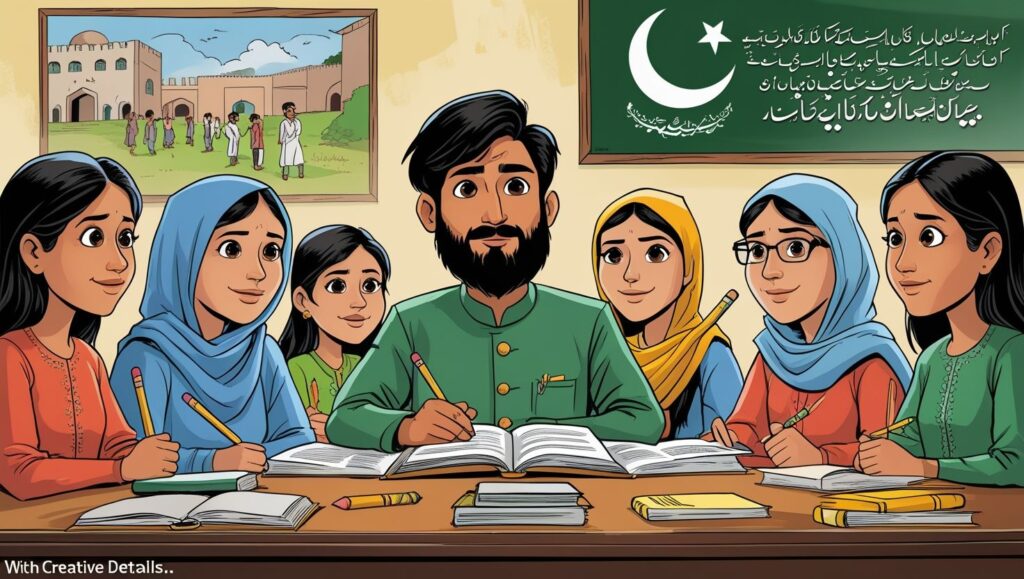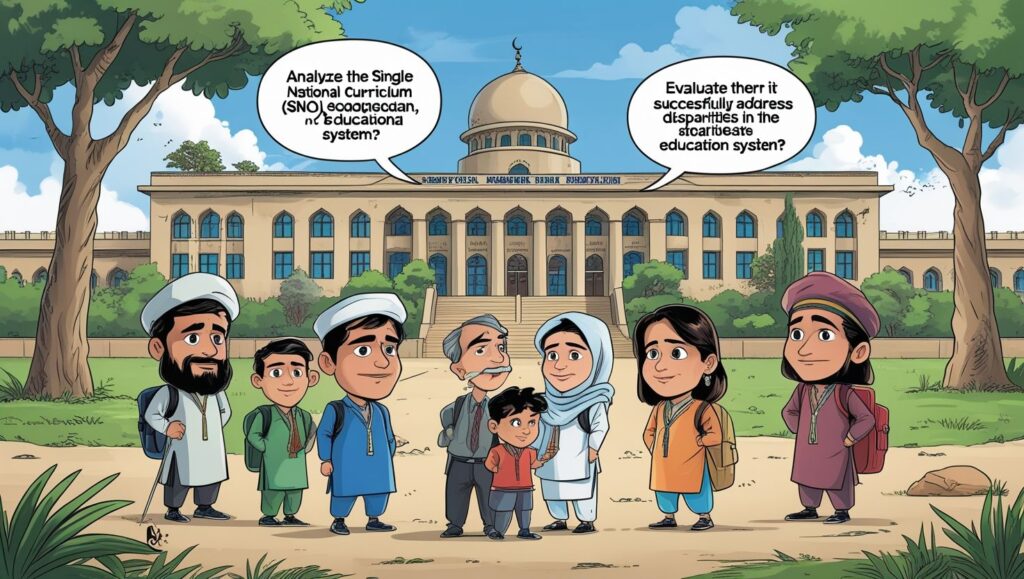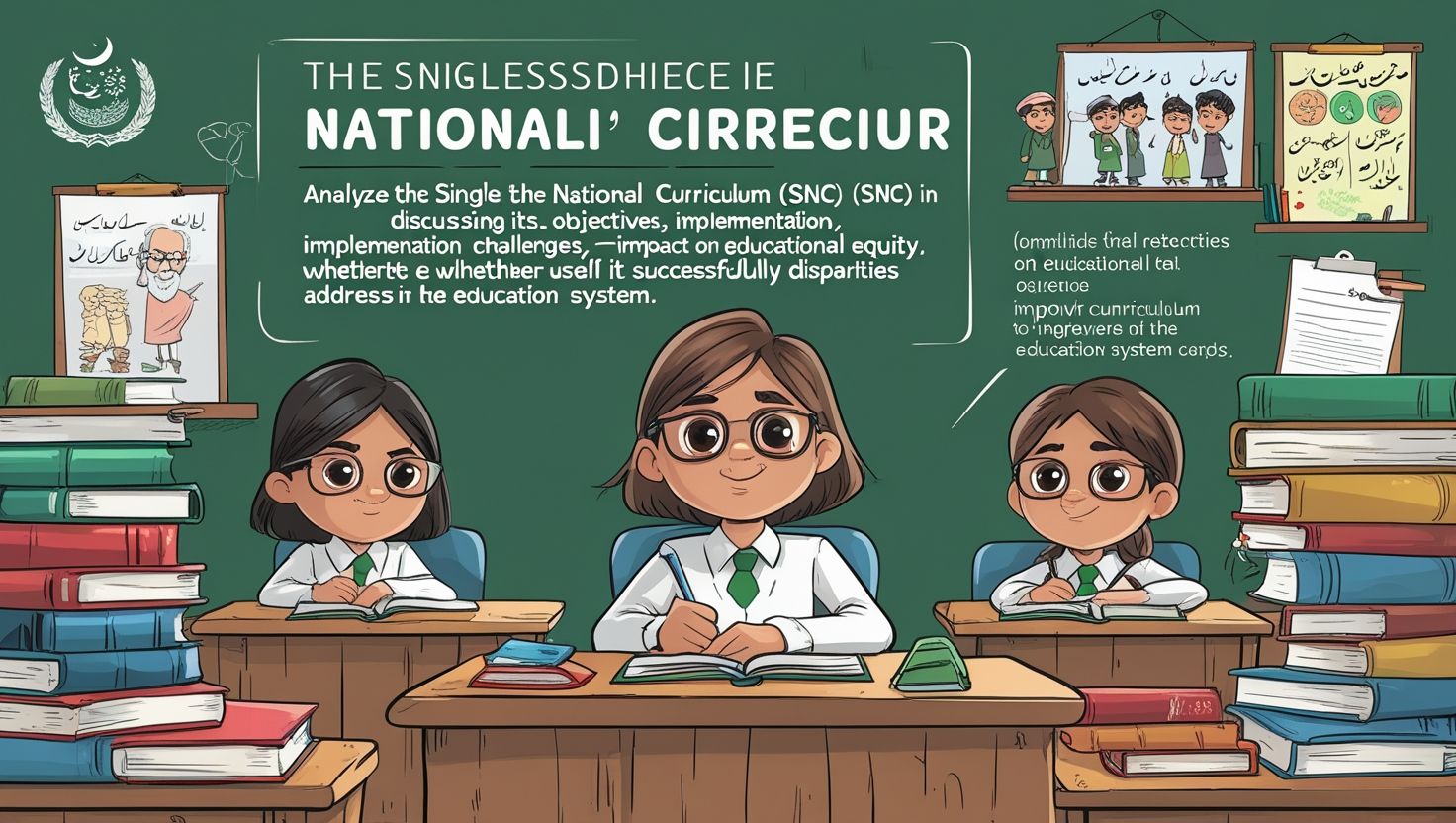Introduction:
The Single National Curriculum (SNC) in Pakistan represents a groundbreaking initiative aimed at standardizing and unifying the educational landscape of the country. Introduced to foster national cohesion, enhance educational quality, and address disparities. The SNC has been a subject of significant debate and scrutiny. In addition, this comprehensive write-up delves into the key aspects of the Single National Curriculum, examining its goals, implementation strategies, challenges, and potential impact on Pakistan’s education system.
Goals of the Single National Curriculum:
- National Unity and Identity: One of the primary objectives of the SNC is to foster a sense of national unity and identity among the diverse population of Pakistan. By providing a standardized curriculum, the initiative seeks to promote a shared cultural and historical understanding, thus contributing to the nation-building process.
- Equity and Inclusivity: The SNC aims to reduce educational disparities by ensuring that students across different regions. And socioeconomic backgrounds receive a uniform and quality education. Secondly, the emphasis on inclusivity seeks to bridge the gap between public and private education, urban and rural areas, and various provinces of Pakistan.
- Critical Thinking and Problem Solving: Another key goal of the SNC is to shift the focus of education from rote memorization to critical thinking and problem-solving skills. The curriculum aims to nurture a generation of students who can analyze information, think independently, and apply their knowledge in real-world situations.

Implementation Strategies:
- Curriculum Standardization: The SNC introduces a standardized curriculum for all students from kindergarten to grade 12. This includes a uniform set of subjects, textbooks, and learning outcomes. The intent is to ensure that students receive a consistent educational experience regardless of their geographical location or economic status.
- Teacher Training and Capacity Building: Recognizing the pivotal role of teachers in the successful implementation of the SNC. There is a strong emphasis on training and capacity building. Teachers are provided with workshops and resources to familiarize them with the new curriculum and pedagogical approaches, ensuring effective delivery in classrooms.
- Technology Integration: The SNC acknowledges the importance of technology in modern education. Thridly, efforts are underway to integrate digital tools and resources into the curriculum to enhance the learning experience. Foster digital literacy, and prepare students for the challenges of the 21st century.
Challenges and Controversies:
- Cultural Sensitivity and Diversity: Critics argue that the SNC may not adequately address the cultural diversity within Pakistan. Concerns have been raised about the potential erasure of regional languages and histories, leading to a loss of cultural richness and identity.
- Resource Allocation: Implementing a standardized curriculum across the entire country requires substantial financial resources. Critics argue that the government must allocate sufficient funds to ensure the availability of textbooks. Training programs, and infrastructure, particularly in underprivileged areas.
- Resistance from Private Schools: Some private schools have expressed reservations about adopting the SNC, citing concerns about the potential impact on their autonomy and educational standards. finally, this resistance poses a challenge to achieving uniformity across the entire education system.

Potential Impact:
- Improved Educational Quality: Proponents of the SNC believe that a standardized curriculum will enhance the overall quality of education. By setting clear learning outcomes and promoting a standardized assessment system. This, in turn, may contribute to producing a more skilled and competitive workforce.
- Social Cohesion: By promoting a shared understanding of history, culture, and values, the SNC has the potential to strengthen social cohesion and national identity. Hence, a generation of students exposed to a common educational experience may contribute to a more unified and harmonious society.
- Global Competitiveness: The emphasis on critical thinking and problem-solving skills positions students to be more competitive on a global scale. The SNC aligns with the demands of the contemporary workforce, where adaptability, creativity, and analytical thinking are highly valued.
Conclusion:
The Single National Curriculum in Pakistan is a multifaceted initiative that aims to transform the country’s education system for the better. While facing challenges and controversies, its potential impact on national unity, educational quality, and global competitiveness cannot be understated. The successful implementation of the SNC requires ongoing collaboration. Adaptability, and a commitment to providing quality education for all students across Pakistan. more details clic here

Your point of view caught my eye and was very interesting. Thanks. I have a question for you.
Your point of view caught my eye and was very interesting. Thanks. I have a question for you. https://accounts.binance.com/si-LK/register?ref=V2H9AFPY
Your point of view caught my eye and was very interesting. Thanks. I have a question for you.
1mmsov
2i0wx7
6hf4yp
Heya! I just wanted to ask if you ever have any trouble with hackers? My last blog (wordpress) was hacked and I ended up losing a few months of hard work due to no data backup. Do you have any methods to protect against hackers?
This design is incredible! You definitely know how to keep a reader entertained. Between your wit and your videos, I was almost moved to start my own blog (well, almost…HaHa!) Fantastic job. I really enjoyed what you had to say, and more than that, how you presented it. Too cool!
59apkw
Thank you for your sharing. I am worried that I lack creative ideas. It is your article that makes me full of hope. Thank you. But, I have a question, can you help me?
As I site possessor I believe the content material here is rattling fantastic , appreciate it for your hard work. You should keep it up forever! Good Luck.
Thank you for your sharing. I am worried that I lack creative ideas. It is your article that makes me full of hope. Thank you. But, I have a question, can you help me?
Your article helped me a lot, is there any more related content? Thanks!
Thank you for sharing superb informations. Your site is very cool. I am impressed by the details that you have on this website. It reveals how nicely you perceive this subject. Bookmarked this web page, will come back for more articles. You, my friend, ROCK! I found simply the information I already searched all over the place and simply could not come across. What a perfect site.
I have been exploring for a little bit for any high-quality articles or weblog posts in this kind of area . Exploring in Yahoo I at last stumbled upon this website. Reading this information So i am happy to show that I’ve an incredibly just right uncanny feeling I came upon just what I needed. I most unquestionably will make sure to don¦t fail to remember this website and give it a glance regularly.
I got what you intend, regards for posting.Woh I am pleased to find this website through google. “Money is the most egalitarian force in society. It confers power on whoever holds it.” by Roger Starr.
I¦ve learn several good stuff here. Definitely value bookmarking for revisiting. I surprise how so much effort you place to make the sort of magnificent informative web site.
Thank you for another informative website. Where else could I am getting that type of info written in such an ideal manner? I’ve a mission that I’m just now working on, and I have been on the look out for such info.
Your home is valueble for me. Thanks!…
I have been absent for some time, but now I remember why I used to love this website. Thank you, I¦ll try and check back more frequently. How frequently you update your website?
Thanks foor the marvelous posting! I certaijnly enjoyed reading it, youu may be a
great author.I will always bookmark your blog and definitely
will come back from now on. I want to encourage you to
ultimately continue your great writing, have a nice evening! https://Z42Mi.Mssg.me
Excellent weblog here! Additionally your website loads up very fast! What host are you the usage of? Can I get your affiliate hyperlink for your host? I want my web site loaded up as fast as yours lol
Thank you for your sharing. I am worried that I lack creative ideas. It is your article that makes me full of hope. Thank you. But, I have a question, can you help me?
Your article helped me a lot, is there any more related content? Thanks!
I’ve recently started a web site, the information you provide on this website has helped me tremendously. Thank you for all of your time & work.
Thank you for your sharing. I am worried that I lack creative ideas. It is your article that makes me full of hope. Thank you. But, I have a question, can you help me?
Thanks for the sensible critique. Me & my neighbor were just preparing to do a little research on this. We got a grab a book from our area library but I think I learned more clear from this post. I am very glad to see such fantastic information being shared freely out there.
I am glad to be one of many visitors on this great web site (:, thanks for putting up.
you are really a good webmaster. The site loading speed is amazing. It seems that you’re doing any unique trick. Moreover, The contents are masterwork. you’ve done a wonderful job on this topic!
I’m impressed, I must say. Really hardly ever do I encounter a weblog that’s each educative and entertaining, and let me let you know, you could have hit the nail on the head. Your idea is outstanding; the difficulty is something that not enough people are speaking intelligently about. I am very completely happy that I stumbled across this in my search for one thing referring to this.